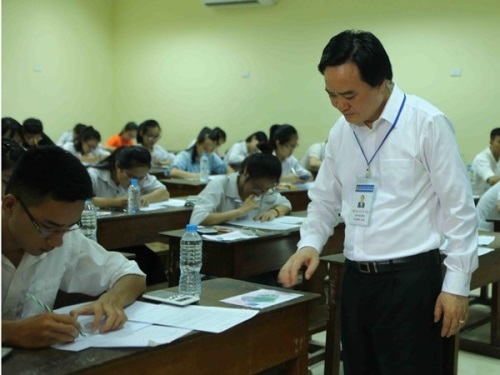Enhancing education and training to meet requirements of Homeland construction and protection
 |
|
Minister of Education and Training Phung Xuan Nha checking the national high school exam |
Inheriting the guidelines of the previous congresses, particularly the Resolution 29 of the Central Plenum 8 (XI tenure) on education and training, the 12th National Congress of the Party continued to pursue the guideline of “Fundamental and comprehensive renewal of education and training”. The Congress’ document stressed on the urgent requirements to fundamentally and comprehensively reform education and training. Over the past time, there have been various shortcomings, ranging from thinking to fundamental factors in the branch. Of which, the two following ones are the most serious, reflecting the quality of the country’s education.
“Education and training has not been truly the country’s top policy” as stipulated in many resolutions of the Party. In reality, it has not been put at top priority in socio-economic development plans and has not been considered the decisive factor to the country’s development.
“The quality and effectiveness of education and training have not met requirements” of the cause of Homeland construction and protection, particularly the requirements for renewing growth model, economic restructuring and sustainable growth.
To overcome the shortcomings, it is necessary to grasp and unify perception on orientations set by the 12th National Party Congress.
First, it is necessary to persist with the view that Education is a national policy of prime importance which is the decisive factor to the realization of the goal “Wealthy people, prosperous, democratic, equal and civilized country”; “Investing for education is to invest for development” so education’s investment should be prioritized in plans for socio-economic development, as well as armed forces modernization and concretized in leadership, finance and human resource fields.
Second, the target of education should be shifted from an education that focuses on knowledge transfer to fostering full development of skills and qualifications of learners. Over the past years, teaching and learning have been conducted in the old manner with more attention be paid on knowledge transfer and less on developing skills and qualifications of learners. To overcome this matter, it is necessary to attach more importance to developing learner’s capability first, rather than knowledge transfer so that their skills, potentials and talents are fully tapped.
Third, education and training in the time of integration must respect objective rules of development. Accordingly, education must be in close coordination with the demand of socio-economic development, Fatherland construction and protection, with the advances of science and technology, the requirements of human resource development and labor market. The following educational principles should be adhered to: “Study accompanies with practice, education with working, theory with practice, schools coordinate with families and society” to effectively overcome the issues of “too many instructors, too few workers” and the trained workers do not meet the demand of intergration and of building and protecting the country. .
Fourth, continue to implement robust and synchronous renovations for fundamentals of education, namely: program, content, method, policy, financial mechanism, etc. and to enhance the quality and effeciency of scientific and technological research and its application in education and educational management. Such renewal should be aimed at qualifications and effectiveness of educational development; attach importance to developing comprehensive capability and quality of learner in order to transform education to self-education and nurture the desire to lifetime study of learners; ensure that educational products perfectly meet the requirements of Homeland construction and protection in the new period.
Grasping the resolution of the 12th National Party Congress on “Fundamentally and comprehensively reforming education and training” during the implementation of the Strategy “Developing education and training in the Military in the 2011 - 2020 period”, military schools and colleges should creatively apply guiding viewpoints of the Congress in accordance with their specific functions and attach importance to the following matters:
1. Continuing to review and reorganize the system of military schools and training aspects basing on the demand in the new period; aiming at limiting duplicated and wasteful training in military schools.
2. Creating more comprehensive perception of the decisive role of the instructors and educational management staff to the qualifications of education and training in order to implement the Project of “Consolidate and develop instructors and educational management staff to 2020” in a strict and scientific manner to make such staff sufficient in both quality and quantity, both red and expert, capable of training human resources for Fatherland construction and integration in the integration era.
3. Attaching attention to the quality of education for the cause of industrialization and modernization; avoid rushing for quantity which may lead to commercialization in education and training. Accordingly, it is necessary to have stricter control of the input and training process, particularly testing and assessment procedures.
Fundamentally and comprehensively reforming education and training can be seen as a revolution which can have profound effect on society. Grasping and implementing creatively fundamental viewpoints of the 12th National Party Congress is the responsibility of the whole Party, the people and the Army in which military instructors take an important role.
Assoc Proff, Doctor. Nguyen Ngoc Hoi